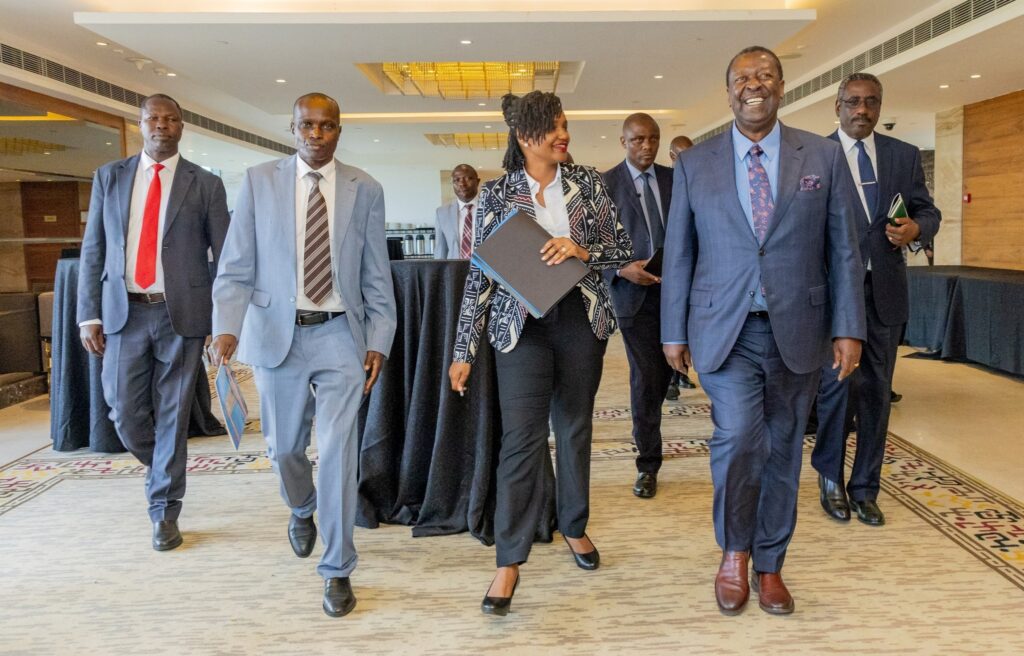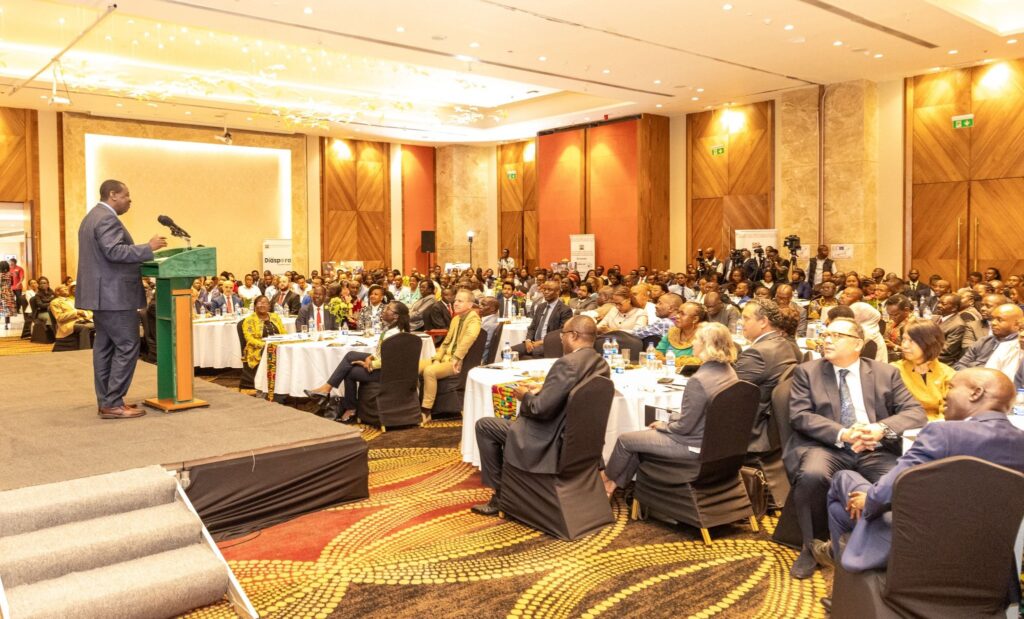Speaking at the launch of the Kenya Diaspora Policy 2024, Prime Cabinet Secretary and Cabinet Secretary for Foreign and Diaspora Affairs Musalia Mudavadi emphasized that Kenya can no longer rely on external donors to underwrite critical services.
He likened the withdrawal of U.S. donor funding for health programs to an earthquake and called for a policy shift that enables Kenya to stand on its own.
“The earthquake has already happened. We must graduate from complaining about Universal Health Coverage (UHC) to fixing what needs to be corrected for it to work. Nobody is going to underwrite the healthcare of the people of Kenya. It has to be underwritten by Kenyans themselves,” Mudavadi stated.
He warned that relying on external funding is no longer sustainable, given the evolving global political and economic environment.
Kenya must explore homegrown solutions, including diaspora investment in the health sector through knowledge transfer, medical infrastructure development, and direct investments.
Mudavadi shared his experience visiting Prince Charles Hospital in Brisbane, Australia, where he met a team of doctors working on a groundbreaking medical breakthrough.
Among them was a Kenyan doctor, part of a team on the verge of a discovery that, if successful, could qualify for the Nobel Prize in Medicine.

“This is the level of excellence that our diaspora is achieving. If we create the right environment, we can tap into this expertise to strengthen our own healthcare system,” he said.
He challenged Kenya to develop policies that attract such talent back home or allow their innovations to benefit the country.
Mudavadi also addressed Kenya’s infrastructure, particularly Jomo Kenyatta International Airport (JKIA), calling it a sleeping giant that must be fully utilized.
He argued that JKIA must be repackaged to become a globally competitive aviation hub, attracting international airlines, investors, and increased connectivity.
“If we package JKIA well, with solid prospects that make sense, the diaspora can fund and finance a new airport. And so is the dual carriageway all the way to Malaba,” he stated.
He emphasized that the Kenyan diaspora, when given the right investment frameworks, can play a critical role in transforming the country’s infrastructure.
On Special Economic Zones (SEZs), Mudavadi cautioned that while these zones are designed to attract investment, they must not do so at the expense of Kenyan citizens.https://touchdigitalnews.com/wp-admin/post.php?post=423&action=edit
“We are creating a conducive environment for foreigners to do business, but are we ensuring that our own people benefit equally? We cannot continue facilitating investment in a way that disadvantages our citizens,” he warned.
He called for policy adjustments to strike a balance between foreign direct investment and local economic empowerment. He emphasized that SEZs should not just attract international capital but also create tangible opportunities for Kenyan businesses, manufacturers, and workers.
He urged that the diaspora must be integrated into the SEZ strategy, ensuring they benefit from the incentives currently extended to foreign investors. https://shorturl.at/w9Jb7
“If we can offer tax breaks and incentives to foreign companies setting up in our SEZs, why not extend the same to our diaspora? Many of them have the capital, the expertise, and the networks to establish businesses in Kenya, and we must give them the same platform to compete,” Mudavadi noted.

Mudavadi proposed that diaspora-focused industrial hubs be established within SEZs, allowing Kenyans abroad to set up manufacturing plants, innovation centers, and logistics hubs that support economic growth while keeping profits within the Kenyan economy.
He further emphasized that through proper policy alignment, the diaspora community could use SEZs to create job opportunities, transfer skills, and invest in large-scale industries that drive national development.
Mudavadi reaffirmed the government’s commitment to facilitating diaspora investment, highlighting initiatives such as the Diaspora Bond and efforts to lower remittance costs.
He challenged Kenyans abroad to think beyond sending money home and explore long-term investments in key sectors such as housing, manufacturing, healthcare, and finance.
“The diaspora is an integral part of our economy. We must provide them with the right policies and incentives to channel their resources effectively,” he said.
Mudavadi concluded by calling for a shift in mindset, emphasizing that Kenya’s future must be built by Kenyans, for Kenyans.
He assured that the Kenya Diaspora Policy 2024, alongside the Diaspora Strategic Plan 2023-2027, provides a comprehensive roadmap to ensure diaspora contributions are fully integrated into national development.
To achieve self-reliance in healthcare, the government must develop strategic frameworks to mobilize domestic resources. This includes increased taxation for healthcare, investment in local pharmaceutical production, and enhancing public-private partnerships in medical services. Additionally, leveraging technology to streamline service delivery and minimize inefficiencies in the healthcare sector will be crucial.
Mudavadi further emphasized the role of higher education institutions in fostering innovation within the healthcare sector. He urged universities to strengthen research programs in medical sciences and create avenues for collaboration with diaspora professionals. By doing so, Kenya can reduce reliance on imported medical expertise and technologies while promoting homegrown solutions.
On infrastructure, Mudavadi pointed out that effective utilization of JKIA will not only enhance Kenya’s position as a major transport hub but also attract more investment into the tourism sector. He suggested that Kenya adopt international best practices in airport management and aviation policies to position JKIA as a preferred destination for global airlines.
Regarding economic zones, he noted that while Kenya has made strides in attracting foreign investors, policies should prioritize knowledge and technology transfer to local businesses. Mudavadi recommended periodic reviews of SEZ agreements to ensure they align with national economic priorities and provide mutual benefits to both investors and Kenyan entrepreneurs.
He highlighted that Kenya’s global competitiveness will be determined by its ability to embrace economic diversification, reduce trade deficits, and support the growth of homegrown industries. He suggested that the government explore incentives that promote industrialization and the export of locally manufactured goods.
Musalia Mudavadi reaffirmed that Kenya’s path to self-reliance lies in strategic policymaking, economic empowerment, and harnessing the potential of its diaspora. He called on all stakeholders, including the government, private sector, and international partners, to collaborate in building a resilient economy that serves the interests of all Kenyans.
